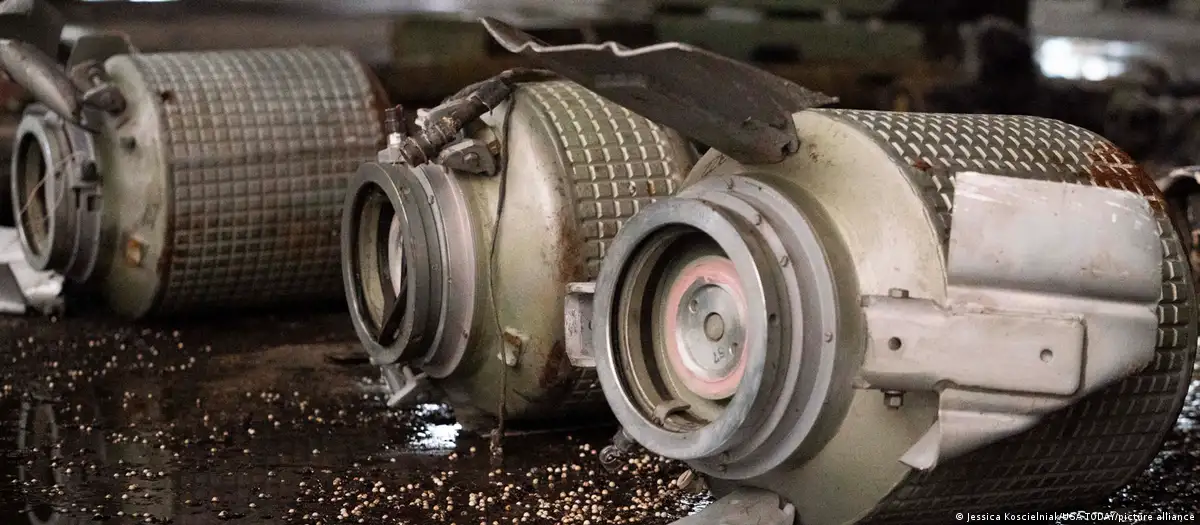Russian leader says he has stockpiles of the munition for use if Kiev does the same. Earlier this month, the US decided to send Ukraine the weapon, banned by 111 countries. In practice, the bomb has already been used, say entities.
(DW) Russian President Vladimir Putin threatened to use cluster bombs in the war in Ukraine if Kiev uses the munitions sent by the US, according to an excerpt from an interview released by Russian state television on Sunday (16/07).
“I would like to say that Russia has sufficient reserves of various types of cluster munitions,” Putin said in a video clip released by Russian state TV. He stated that he would not want to use this resource, “but of course, if it is used against us, we reserve the right to take congruent measures.”
Earlier this month, the White House announced that it would provide these bombs to Ukraine, fulfilling a request from Kiev. On Thursday, the Pentagon said those munitions had already arrived in Ukraine.
Both Russians and Ukrainians have been using cluster bombs, with Russia, according to international observers, using such weaponry indiscriminately against civilian targets as early as the beginning of the invasion in mid-2022, according to an Amnesty International investigation.
The NGO Cluster Monitor Coalition points out that after the war began, at least 689 Ukrainians were killed by cluster bombs in the first half of last year alone.
What are cluster bombs?
Once dropped, cluster bombs, also known as cluster bombs, release a number of smaller projectiles or fragments that scatter over a large area, amplifying their destructive potential.
As not all submunitions released after the explosion are detonated, human rights organizations disapprove of the use of this type of arsenal, since “dormant” fragments expose civilians to risks even when there is no longer a military conflict in a region, making these areas real minefields.
For this reason, the use of this type of weaponry was banned in a 2008 treaty signed by 111 countries – Russia, Ukraine and the United States, however, are not signatories to the international agreement. Brazil, which manufactures these bombs, is also not a signatory.
How the US justified its decision
A member of the US military told reporters that cluster bombs could help Ukraine break through Russian trench lines and hit a multitude of targets up to 300 kilometers away. “The Ukrainians asked for it, other European countries supplied it, the Russians are using it,” General Mark Milley said.
Security adviser Jake Sullivan also defended the deployment. “Ukraine has committed to post-conflict demining efforts to mitigate any potential harm to civilians and that will be necessary regardless of whether the United States provides these munitions or not because of their widespread use by Russia.”
Sullivan further argued that Ukraine’s use of this type of munition is also different from what Russia has been doing. “Ukraine would not use these munitions in foreign lands.” “This is the country they are defending.”
“We recognize that cluster munitions create a risk of harm to civilians from unexploded ordnance. That’s why we have delayed the decision as long as we can. [But] there is also a huge risk of civilian harm if Russian troops and tanks break through Ukrainian positions and take more Ukrainian territory and overwhelm more Ukrainian civilians because Ukraine does not have enough artillery. That is intolerable to us,” he said.
President Joe Biden said in an interview with CNN that supplying those bombs was a “difficult decision” but that he was ultimately convinced to send the weapons because Kiev needs ammunition in its counteroffensive. “The Ukrainians are running out of ammunition,” he said. “Either they have the weapons to stop the Russians now – stop them from stopping the Ukrainian offensive in these areas – or they don’t. And I think they needed them. And I think they needed them.”
Ukrainian parliamentarian Oleksandra Ustinova argues that the military already has to defuse mines in much of the territory retaken from Russia, and that in the process they would be able to collect any unexploded ordnance from cluster bombs used against Russian troops.
Reactions from NATO and Germany
Secretary General of the North Atlantic Treaty Organization (NATO) Jens Stoltenberg said earlier this month that the military alliance has no position on cluster bombs – more than two-thirds of the 30 member countries have signed the international convention to ban the use of such weapons. According to Stoltenberg, the decision on whether or not to use them is up to each individual country in the alliance. “We are facing a brutal war,” Stoltenberg said, noting that both sides already use such bombs, but that Ukraine is the only one doing so in self-defense.
Germany, also a signatory to the treaty, has made clear it will not supply Ukraine with such munitions, but has avoided openly antagonizing the U.S. decision. Foreign Minister Annalena Baerbock reinforced that Germany stands by its adherence to the agreement.
